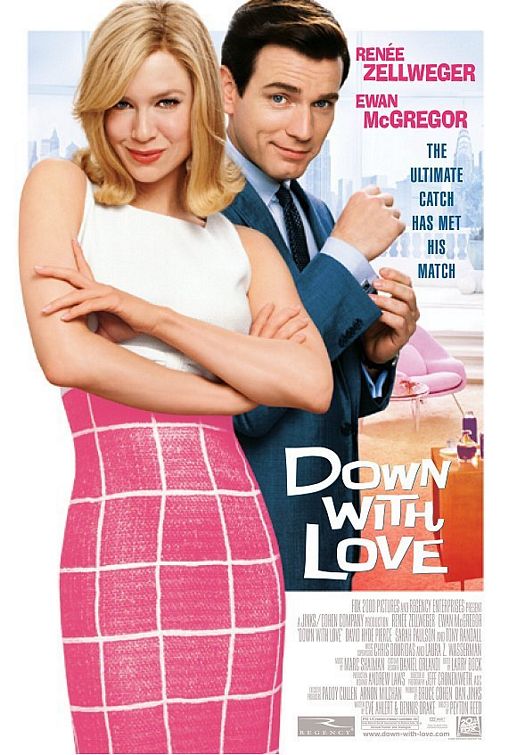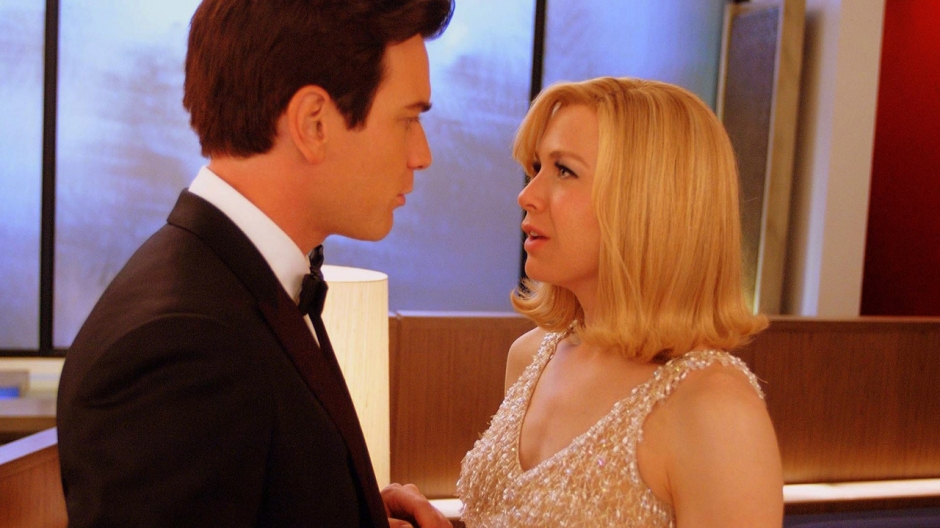EDIT (May 2016): I’ve upgraded this from good (which I gave it when I reviewed it back in December 2013) to excellent because I’ve realised upon re-watching that it is clearly one of my favourite films. It is just such sheer delight to watch Sarah Paulson and David Hyde Pierce in particular.
Occasionally when re-watching DVDs, I like to look back at its entry on Rotten Tomatoes and check what the critical consensus (in so far as it’s represented there) suggests about a film. Therefore I was surprised to find a distinct lukewarm-ness with regards to this brightly-coloured Technicolor pastiche of 1960s romantic comedies. Surprising because although I can’t honestly hold it up as a masterpiece [EDIT 2016: I can and I do], I do still love Down with Love (I own a copy, after all). Perhaps telling you about how it provided me cheer on a dreary evening in Prague, when I was travelling around East Europe ten years ago, is hardly effective film criticism, but there you go: it is a zippy, frothy, stylish little film that doesn’t really set out to make any grand statements.
The leads are stylishly iconic journalist Catcher Block (Ewan McGregor) and arriviste naïf and newly-published author Barbara Novak (Renée Zellweger), who do their best Rock Hudson and Doris Day impressions—appropriate, given that the film takes its most visible cues from such period comedies as Pillow Talk (1959). Yet, as much as you may imagine that I appreciate McGregor’s mellifluous name, I’ve never been a huge fan of either him or Zellweger as actors. It’s not that they have great chemistry here, but they certainly do both look the part. They wear the clothes well, in other words, and show a fair amount of gameness in putting across such gurning caricatured characters, blending effortlessly into the saturated colours of the mise en scène.
What really sells the film, though, are David Hyde Pierce and Sarah Paulson as Pete and Vikki, the respective editors of the two leads. Sure, Pierce is doing a version of his neurotic character on TV show Frasier, which can hardly have been much of a stretch for him, but his performance also harks back to Tony Randall in such films as Frank Tashlin’s sparkling Will Success Spoil Rock Hunter? (1957, and which for the record is a masterpiece). That Randall himself makes a cameo appearance as the head of Pete’s publishing company is just another nod towards that rich filmic heritage. As for Paulson, seen most recently by me as the uptight sister in Martha Marcy May Marlene (2011), she is unrecognisable here, achieving some perfect comic timing in her delightful repartees with Pierce, and guiding Barbara towards her hard-headed feminist success. Both actors put across a degree of acting brio that lifts the film, and if it never really moves beyond pastiche, it is at least a very accomplished and enjoyable one.
I’ve mentioned the look of the film, all saturated colours in the set design and widescreen cinematography, and bold contemporary fashions. There are certainly far worse stylistic benchmarks to emulate than that of Frank Tashlin (whose pop culture films from the 1950s are particularly worth checking out). Elsewhere, there’s some predictably broad humour in some of the touches, like the anti-war protestors and the ridiculous use of iconic buildings in the intro sequence, where every change of shot—from Barbara’s arrival to her getting a cab uptown—showcases a different (and geographically impossible) New York sight. Elsewhere, use is made of the kind of split-screen techniques seen in Pillow Talk, but for groaningly double entendre purposes.
It would of course be very easy to marshal all this detail as successively damning points against the film’s sunny inanity—like baking a soufflé, this kind of enterprise, aiming for light frothiness, can so easily collapse. Therefore it’s up to each individual viewer to judge whether it’s been successful. For me, though, Down with Love is a consistent joy, and one I like to revisit every so often.
CREDITS
Director Peyton Reed; Writers Eve Ahlert and Dennis Drake; Cinematographer Jeff Cronenweth; Starring Renée Zellweger, Ewan McGregor, David Hyde Pierce, Sarah Paulson, Tony Randall; Length 97 minutes. Seen at a cinema in Prague, Friday 3 October 2003 (and since then on DVD at home, London, most recently on Tuesday 10 December 2013 and Thursday 5 May 2016). 






